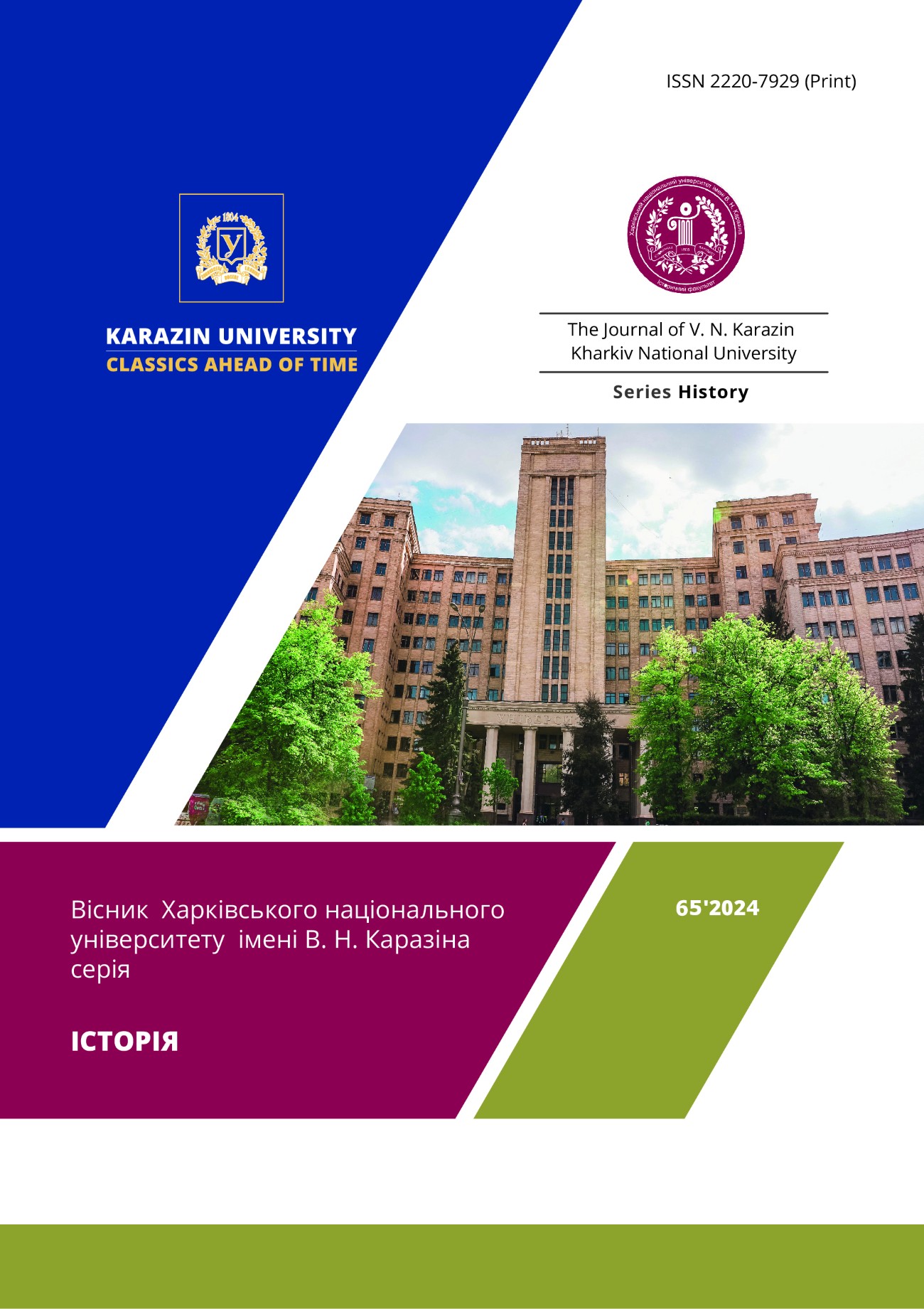‘Nation, Language, Blood’: (Un)Popular Themes in the Ukrainian Propaganda of the Imperial Era
Abstract
The article considers the extent of the presence of national/nationalist ideology in the ideological content of Ukrainian propaganda literature in the Russian Empire. The study is based on the most widespread and dynamic type of such literature — leaflets, which in the late 19th and early 20th centuries represented for political parties and organizations one of the principal means of communication with the masses. Methodologically, the work positions itself in the field of nationalism studies and employs elements of discourse analysis and content analysis. The categories of ‘nation’, ‘language’, and ‘blood’ are chosen as keywords, and their use together as a ‘triad’ is considered a marker of national radicalism. The problem has not been studied in much depth, and its source base and archaeographical aspects remain poorly known (it may be noted that the corpus of leaflets analyzed by the author is many times larger than previously utilized by scholars). It is found that, among political organizations, only the Ukrainian People’s Party consistently made use of the ‘triad’, which confirms the appropriateness of employing this combination of keywords to mark national-radical ideology. Elements of the ‘triad’ rarely occur in the publications of other Ukrainian political bodies, and in the case of the most numerous and popular of them, the Revolutionary Ukrainian Party (RUP-USDLP), they appear only in the early days of its existence and then later as a result of the initiative of some local branches at the height of the revolution of 1905– 1907. The author thus concludes that during this period the dissemination of the ideology of Ukrainian nationalism was not carried out purposefully, systematically, or on any appreciable scale. Attempts in this direction were consistently made only by the radical right-wing fringe of the national movement, but its activities were limited and had little noticeable impact on society. This was one of the main reasons for the weakness of national identity among the Ukrainian population of the Dnieper basin during the imperial era.
Downloads
References
Derzhavnyj arkhiv Kharkivs’koi oblasti (DAKhO), f. 969. (In Ukrainian)
Hermajze, O. Narysy z istorii revoliutsijnoho rukhu na Ukraini. T. 1: Revoliutsijna Ukrains’ka partiia (RUP). B. m., 1926. (In Ukrainian)
Istoriia ukrains’kykh politychnykh partij. Kinets’ ХIХ st. — 1917 r. Khrestomatiia-posibnyk. Ch. 1. Kyiv, 2003. (In Ukrainian)
Kalyta, L. V. Pytannia derzhavnoho ustroiu v lystivkakh ukrains’kykh politychnykh partij (1900–1904 rr.). U zb.: Ukrains’ka derzhavnist’: istoriia i suchasnist’. Materialy nauk. konf. Kyiv, 1993, s. 164–166. (In Ukrainian)
Kalyta, L. V. Lystivky hromads'ko-politychnykh orhanizatsij iak dzherelo vyvchennia suspil'noho zhyttia v Ukraini: Avtoreferat dysertatsii na zdobuttia naukovoho stupenia kandydata istorychnykh nauk. Kyiv, 1994. (In Ukrainian)
Kas’ianov, H. Teorii natsii ta natsionalizmu. Kyiv, 1999. (In Ukrainian)
Kollard, Yu. Spohady iunats’kykh dniv. 1897–1906. Ukrains’ka students’ka hromada v Kharkovi i Revoliutsijna Ukrains’ka partiia (RUP). Toronto, 1972. (In Ukrainian)
Kovalenko, O. Na mezhi dvokh vikiv (Spohady pro Ukrains’ku Students’ku Hromadu v Kharkovi). Vyzvol’nyj shliakh [Liberation рath], no. 2, 1993, s. 235–243. (In Ukrainian)
Lystivky ukrains’kykh politychnykh partij ta orhanizatsij mizh dvoma revoliutsiiamy (cherven’ 1907 – poch. 1917 rr.): zb. dokumentiv ta materialiv. Uporiad. B. I. Korol’ov, I. S. Mykhal’s’kyj. Luhans’k, 1999. (In Ukrainian)
Mykhal’s’kyj, I. S. Dzherela z istorii ukrains'kykh politychnykh partij kintsia ХIХ — pochatku ХХ st. Luhans’k, 2003. (In Ukrainian)
Naumov, S. O. Hlukhivs’ka orhanizatsiia RUP-USDRP ta ii literatura. Siverians’kyj litopys [Siverian chronicle], no. 2–3, 2005, s. 3–15. (In Ukrainian)
Naumov, S. O. Nelehal’ni ukrains’ki vydannia pochatku ХХ st. na Livoberezhzhi (za zhandarms’kym dokumentom 1903 roku). Visnyk Kharkivs’koho natsional’noho universytetu imeni V. N. Karazina. Seriia «Istoriia» [The Journal of V. N. Karazin Kharkiv National University. Series: History], vyp. 31, 1999, s. 145–156. (In Ukrainian)
Naumov, S. O. Ukrains’kyj politychnyj rukh na Livoberezhzhi (90-i rr. ХІХ st. — liutyj 1917 r.). Kharkiv, 2006. (In Ukrainian)
Naumov, S. O. «Zamakh» na pam’iatnyk O. S. Pushkinu v Kharkovi. Skhid – Zakhid [East – West], vyp. 1, 1998, s. 118–126. (In Ukrainian)
Natsionalizm. Antolohiia / Upor. O. Protsenko, V. Lisovyj. Kyiv, 2000. (In Ukrainian)
Pastushenko, N. Nevycherpne dzherelo pedahohichnoi mudrosti. Pedahohichna dumka [Pedagogical thought], no. 1, 2011, s. 5–23. (In Ukrainian)
Porsh, M. Na spil’nomu shliakhu. U zb.: Symon Petliura v molodosti. L’viv, 1936, s. 31–61. (In Ukrainian)
Rybalka [Yurkevych], L. Nastia Hrinchenko (Spomyny). Meta, ch. 17–18, 1908, s. 2–5. (In Ukrainian)
Tsentral’nyj derzhavnyj arkhiv vyschykh orhaniv vlady i upravlinnia Ukrainy (TsDAVO Ukrainy), f. 3807. (In Ukrainian)
Tsentral’nyj derzhavnyj istorychnyj arkhiv Ukrainy u m. Kyievi (TsDIAK Ukrainy), f. 274, 320, 336, 1439. (In Ukrainian)
Tysiacha rokiv ukrains’koi suspil’no-politychnoi dumky. U 9-ty t. T. 6. Kyiv, 2001. (In Ukrainian)
Ukrains’ka partiia samostijnykiv-sotsialistiv (U.N.P.). Viden’; Kyiv, 1920. (In Ukrainian)
Ukraіnskіj vopros: іzdanіje zhurnala «Ukraіnskaja zhyzn’». Sankt-Peterburg, 1914. (In Russian)
Copyright (c) 2024 Serhii Naumov

This work is licensed under a Creative Commons Attribution 4.0 International License.
Authors who publish with this journal agree to the following terms:
- Authors retain copyright and grant the journal right of first publication with the work simultaneously licensed under a Creative Commons Attribution License that allows others to share the work with an acknowledgement of the work's authorship and initial publication in this journal.
- Authors are able to enter into separate, additional contractual arrangements for the non-exclusive distribution of the journal's published version of the work (e.g., post it to an institutional repository or publish it in a book), with an acknowledgement of its initial publication in this journal.
- Authors are permitted and encouraged to post their work online (e.g., in institutional repositories or on their website) prior to and during the submission process, as it can lead to productive exchanges, as well as earlier and greater citation of published work (See The Effect of Open Access).




